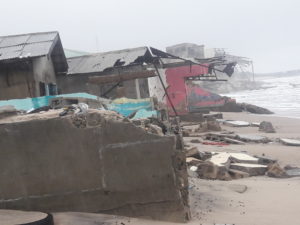Akanbi lived his entire life in his ancestral home in Idado, a now semi-rural coastal community in Eti-Osa, where he was born, lived and left for the great beyond at the age of 97.

In another coastal community where the Atlantic Ocean stretches to, spreading its aquatic splendour and blessedness of biodiversity (various life forms), it was in this community I first beheld the guitar ray fish, pufferfish, flying fish, dolphins, and many more I thought are extinct in Nigeria. Adebayo lived in this community from 1983 until about five years to my first visit to Akodo Ise. He died in 2015 as inscribed on his tombstone which could be mistaken as debris of pillar.
In different encounters where I saw these two graves at the shores amongst other debris of tombstones, the question that anchors my mind is, why are the dead buried at the seashore of all places?
According to some traditions and customs as practised in the southwest and in the southsouth parts of the country, the riverbanks become the vault where the remains of whoever that drowns is deposited, the coast is usually the final resting place as it was for Akanbi and Adebayo.
As I wandered along the coast, still I wondered why a cemetery at the sea, even though I had read of burial at sea in the western part of the world; a now rare yet surviving practice native to the navies where the remain if honourably wished by the deceased is cremated or buried about 3 nautical miles offshore, that is like about half (5.5km) of Nigeria’s longest bridge – the Third Mainland Bridge.
Our coastline, particularly rural coastal settlements, can be mistaken for a scanty cemetery and a surviving testament of the increasing climate crisis, environmental destruct and disasters including sea surge, coastal flooding, sand dredging and channelisation. Many innocent lives, properties and heritage have been lost to these sad events just as I witnessed that night.
I arrived at the Okun Ajah, a seaside community in the Eti-Osa axis hours after the community experienced a significant sea level rise and extreme strong wind. The ocean again had surged and, this time, it excavated graves at the shore, drowned the dead such that they died again. The strong waves chased away the living from their ancestral homes and held the host hostage; leaving the living homeless and nowhere to go.
It was a gory and sorry sight of corpses being exhumed and a search of a final resting place.
The Cries, Claim and Clamour; for Climate Justice, mindset and urbanisation reset
The locals in their agony shared different verses of lamentations of what caused the sea surge, some claimed that it is various industrial dredging activities, sand mining, land reclamation for real estate projects, oil exploration, abandonment of the shoreline protection projects (The Great Wall). Some even believe and point fingers at the deity of the sea “Oluokun”, that the gods are angry and must be appeased, they claimed.
For the environmental crisis, extreme weather conditions, pollution, loss of properties and deaths related to flooding in rural settlements, urbanisation and urban settlement can be held liable being an undeniably major force disrupting biodiversity, ecosystems and nature. More unfortunate and pending doom that urbanisation is expected to reach 68% of the global population in 2050, already averaging 85% in developed countries.
A pending doom for rural settlement and a call for urban resets and mindset change towards sustainable living including climate action advocacy, mapping conservation areas, policy implementation, tree planting and importantly recycling are vital strategies for the clamour of climate justice and as innovative solutions are essential to maintain a fulcrum between biodiversity alongside urbanisation.
Recycling and its impact in urbanisation cannot be overemphasised, in a recent tour to a recycling facility (collection centre) in Ajegunle established by Circularity Africa where we discussed and saw the ecological and socio economics impacts of recycling.
The need for collective responsibility and a shift in our attitude towards our environment and a mindset reset on climate change which affects all of us (urban settlement more) in diverse manifestations and unless we take responsibility by doing what we can including using media and storytelling as a tool for climate justice particularly in rural settlements that are less contributors to climate change and yet the most vulnerable.
There is no planet B. It should be considered a sound warning and a call to address the issue of climate and global warming with global to local actions and solutions like proper waste disposal, sanitation so as to protect our heritage, lives and rural settlements from extinction, and the dead don’t die again.
By Genevieve Aningo, Chinedu Isagah and Afere David Ajingbade. Article written as part of the Young Media for Climate Justice initiative
